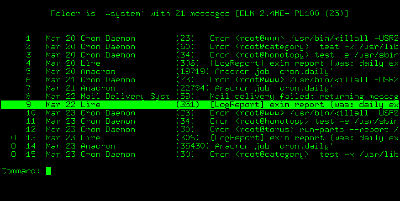Prompted by a new article in Mother Jones about the Landmark Forum, my friend Spencer recalled my article on the same subject from my old website circa 1998. Here it is, resurrected for the 21st-century web.
The last line — “This remains the central mystery of my life” — no longer applies. It’s still a mystery, but not the central one of my life. That’s reserved for trying to figure out Sarah Palin supporters.
In December 1997, my close friend Steve, an admirably intelligent and level-headed person, announced that he was going to spend an entire three-day weekend at the Forum, a group awareness training seminar run by an outfit called Landmark Education. Cost: $325, and three solid days of his life.
We (that is, Steve’s friends) knew others who’d gone through the Forum in the past. A wave of Forum marketing swept the Carnegie Mellon campus back in the 1980’s. Those classmates who got caught up in it had been transformed into blissed-out zombies who smiled too much, were too understanding, were in touch with their inner whatevers, and went on and on endlessly about “I accept that” and “I’ve always <insert behavior here> but now I understand why I <insert behavior here>” and “I love you all” and so on. These were people who were adrift, who lacked competence in dealing with situations, who had unsatisfying connections to other people, and who generally were vulnerable to having their psyches manipulated. We knew that Steve was a paragon of competence, someone who always had a solid idea of what he thought about things and about people. What could he expect to get out of the Forum?
The ridicule came fast and furious. “Personally, knowing that I’m beyond the reach of profiteering New Age hucksters gives me all the empowerment, self-actualization, spiritual harmony, and inner quietude that I need,” I wrote. “$325? When you could spend all day masturbating for free?” wrote my friend Christian.
Steve promised he was going only for purposes of intellectual curiosity. His ex-girlfriend Carlyn was a Landmark enthusiast, and to Steve it was worth the money and the time to cut through the preconceptions and find out about it firsthand. When I learned his motivation, I provisionally withdrew my ridicule.
In researching Landmark prior to Steve’s Forum seminar, I learned that it is the current incarnation of est, the 1970’s touchy-feely self-help personality-deconstructing blissed-out zombie training which is related to Scientology. Landmark eschewed some of est’s more controversial practices, apparently in favor of wider marketability. Although Landmark denounces the more overt brainwashing techniques of est — including the confrontation, intimidation, and physiological stress that are also hallmarks of Scientology — I later learned that those methods are in fact still present in the Forum, they’re just toned down for subtlety. Unlike est, the Forum permits you bathroom breaks whenever necessary — but the long days sitting still in uncomfortable chairs under faintly buzzing fluorescent lights still induces physiological stress. The psychologically vicious personal attacks that est employed to make students admit their worldview needed fixing are replaced with a more insidious pressure to conform that comes from the Forum’s large group setting.
In the office on Monday morning, Steve assured us it had been worth every penny. In enthusiastic but frustratingly vague terms, he described what the experience had been like. We tried to nail him down on specifics beyond the simple logistics (lots of people seated together in a large room for many hours over three days), and Steve gamely answered our questions all day long, bringing his considerable powers of articulation to bear on the task of properly conveying what the Forum was all about. But each time we thought we understood him and tried to repeat our understanding back, he’d say, “No, that’s not exactly it.” I didn’t know it then, but it was the beginning of a pattern that continues to this day: no one who’s been through the Forum can satisfactorily describe it.
The best we could get out of him was this: for three days, the charismatic Forum leader energetically delivers a series of connected lectures on limiting factors in human nature — such things as making decisions based on the past rather than on the future one imagines, and failing to really listen when another person is speaking because one feels one already knows what will be said. A great deal of interaction with the audience is involved; the Forum leader challenges one person after another in Socratic fashion to relate short anecdotes about how the topic of the moment relates to his or her life. The multitude of viewpoints is thus delivered at such a pace as to trigger a kind of synergy in the minds of the audience, allowing them to have “breakthroughs” about what has been holding them back in their lives.
Steve admitted that the content per se is nothing more than one could get from a good background in philosophy, or even a good novel. But the unique aspect that made it so effective for him was the participation of so many different people offering so many different outlooks, which audience members mentally “try on” for size at a frenetic pace. He claimed to have had a number of useful breakthroughs. One of the exercises assigned during the few breaks in the Forum is to call someone with whom you have some unresolved issue, and resolve it in the forthright way taught in the class. Steve said this exercise helped him overcome a hurdle in one of his interpersonal relationships.
Another of the exercises is a transparent marketing ploy. Upon returning to real life on the Monday morning after a Forum seminar, the Forum “graduate” is supposed to recruit a number of friends and relatives — a number that the graduate commits to on Sunday night while in the full flush of having completed the Forum — to return with him or her to a Tuesday night wrap-up session. Since most grads’ heads are in too much of a whirl right after the Forum, part of the Tuesday night session’s purpose is to educate their loved ones about what they just underwent with a minimum of excited babbling. Another (openly acknowledged) purpose is to try to sign up new students, and to persuade the old students to sign up for advanced courses. Still another purpose is to top off the weekend’s indoctrination after the grad has had a chance to internalize some of the ideas.
Steve asked me to attend. I didn’t want to; my skepticism about the Forum was not assuaged by Steve’s incoherent enthusiasm. But he persisted, and my enormous respect for Steve made me conclude that there had to be something to it that I was failing to see. For his sake, I broke an earlier Tuesday night engagement and went with Steve.
When we arrived, a little early, we milled about talking to people Steve had met during the course. One fetchingly attired woman declared to Steve, after he complimented her appearance, that before the course, she would never have gone out so daringly dressed. But the course had allowed her to overcome some self-esteem problems she had, and she was able to say “what the hell.”
Good for her, I thought, but self-esteem has never been one of my problems. I felt my preconceptions about the Forum strengthening, not the least reason for which was the blinding sea of beaming Stepford smiles on the faces of the many Forum volunteers ushering people around and handing out literature. Their ultra-friendly demeanors were clearly meant to put people like me at ease, but had exactly the opposite effect. Nevertheless, I reminded myself that responsible skepticism implies being open-minded, and I renewed my resolve to be so.
We took our seats in an auditorium filled with Forum grads and their many “guests,” some three hundred people in all. For a few minutes Steve left me alone while he went to find Leslie, his other guest for the evening.
Distinguishing me by my non-Forum-grad name tag, a fresh grad named Kerry sat down next to me and immediately struck up a conversation. He told me how wonderful he found the Forum to be, and I confessed my skepticism. My problem, I said, is that the things the Forum supposedly encourages one to do — examine one’s behaviors, understand one’s motivations, “inquire” into what it “means to be human” — are all things that I taught myself to do long ago, with perfectly satisfying results. No doubt others who are less introspective than I could derive many benefits from learning such mental disciplines, but as for me, it felt redundant. Kerry assured me that he’d felt just the way I did before the Forum began.
Steve showed up with Leslie around the same time that the session began. The Forum leader, Jack Schrop, a extremely magnetic middle-aged man who was a Navy SEAL commander in Vietnam (and with whom Steve was unabashedly impressed), took the stage and welcomed us. He said a few words about Landmark and the Forum, made a bit of a sales pitch, then invited some of the new grads to take the microphone to describe any breakthroughs they’d had since finishing the course on Sunday night.
Hands shot up all over the room. Jack picked out five or six speakers at a time, three or four times overall. The speakers took turns addressing the auditorium for a few minutes apiece. Most of them credited the Forum for their newfound ability to address such a large group, which before the course they wouldn’t have had the self-confidence to do. (I have no problems speaking in front of large groups, I thought to myself, further convincing myself that the Forum was probably not for me.)
Some of the breakthroughs reported by the new grads were more interesting. One man said the Forum helped him finally sever his ties with some old drug-dealing buddies. A woman described breaking through a twenty-year impasse in her relationship with her mother. One shy, introverted systems analyst found himself gabbing to everyone in sight when he went to work Monday morning. A man who’d been avoiding a difficult issue with a close friend finally aired it, ending the friendship but giving him closure. And on and on.
Jack interjected various comments throughout the unrehearsed testimonials. He explained how he got involved with the Forum, acknowledged the concerns of those (like me) who found the shining happy people of the Forum to be a little creepy and disconcerting, and sprinkled some Forum philosophy here and there. “We promise breakthroughs,” he said. “We offer the design principles of humanity,” he also said. “We don’t solve your individual problems; you do that.”
At one point, he offered a sample pithy Forum insight “for free”: “If you’re afraid that people think a certain thing about you — if they stop talking when you walk by an open office door — don’t worry: they do. They think the same things about you that you think about them. So what? That’s all.”
At one point, Jack Schrop asked all the guests to turn to their respective hosts and ask two questions: “Do you want me to enroll in the Forum?” and “Why?” Leslie and I did as instructed, asking Steve the two questions, and Steve replied “Yes” and “Because I think you’ll derive benefits from it,” which he briefly described in terms we’d already been discussing.
I told him that I was increasingly eager to be persuaded, but so far, no go. I repeated to him the business about how I’m already introspective, how I already solve my own problems in ways that sound like what the Forum people are talking about, and so on. I also assured him that, as skeptical as I was about the Forum, I was at least as skeptical about my own claims of being so well-adjusted. In other words, I was open to the possibility that I don’t cope with my problems as well as I think I do. Open to the possibility, but not convinced of it.
Apart from that, I said, there was the matter of not having a spare $325 to throw around.
Eventually, Jack Schrop announced that the guests would be divided into four smaller groups and led into separate rooms (to hear the Forum marketing pitch), while the new grads attended a special session of their own. But first, interested guests were invited to sign up for future Forum sessions, with the $325 tuition payable on the spot (of which all but $50 was refundable). A large handful of guests did sign up; then we broke up into the smaller group sessions.
The leader of my group was a distressingly enthusiastic fellow named Curt. He began by reiterating much of what Jack had said, particularly that the Forum promises “breakthroughs,” especially in the areas of “power” and “freedom.” Then he painted some scenarios that most people can probably identify with (not me, though). For example, he asked how many people felt their boss at work limits their self-expression? Dozens of hands went up. Who felt that they let life happen to them instead of making it happen? Again, dozens. Who ever made a New Year’s resolution they didn’t keep? Etc.
Curt explained that most of us allow our futures to be determined by our pasts; we get stuck in behavioral ruts that, after a while, we don’t question or revise. What Forum helps you to do, he said, is to take your past out of your future and put it into the past where it belongs. That leaves nothing in your future, which is as it should be; the future is what you make it.
This message all sounded fine to me, even if the setting and the messenger were a little off-putting, but again, it was nothing that I hadn’t already discovered from years of learning, living, and reflecting. As he kept talking about more and more of the same kinds of things, I began to feel pretty impressed with myself; was I the only one who had discovered these “secrets” for himself?
The session with Curt was highly interactive, with guests asking questions or responding to prompting by Curt. He worked the group well; after not much time had passed, several of the guests began spouting the kind of psychobabble that they believed was expected in response to his prompts. For example, while discussing one guest’s predisposition toward failure in many aspects of his life, Curt uncovered some detail of that guest’s self-destructive habits. When he asked why the guest didn’t simply discard that detail from his life, the guest obliged with, “It helps me maintain my self-image as a failure.” Whenever someone played into Curt’s hand in this way, he responded with a smarmy, “Yes! Thank you! Fabulous!”
We took a break and milled about for a bit. Interested guests again were invited to register for future Forum sessions, and at least half the room signed up on the spot. Meanwhile, Curt singled me out and struck up a conversation, no doubt sensing that I was a holdout. I explained my skepticism to him in much the same way I explained it to Kerry and to Steve. Curt deflected my objections by pointing out that only by taking the course could I discover whether I could derive any benefit from it.
I had other concerns, though. “Lots of people seem to act pretty cultish about the Forum, frankly,” I said. “When I have revelatory insights into myself, I don’t give the credit to the latest book I’ve read or to any other one thing; the credit belongs to me, the sum of all of my experiences. But Forum grads can’t stop talking about how it’s the Forum, not themselves, that changed their lives.”
Curt said that some participants’ cultishness about the Forum was a problem, because it was off-putting to others, but he said that I seemed to have the right attitude about it and he hoped I’d consider signing up.
The small group session continued in the same vein for a little while longer, then the evening was over.
I did not sign up to take the course.
A few days later, Steve announced, to the astonishment of everyone, that he would be attending the “advanced course,” the next step in Landmark’s curriculum (and twice as expensive as the Forum). The astonishment came from the fact that Steve had earlier said he would not take any other Landmark courses, now that he’d had the firsthand Forum experience he was after.
“It’s brainwashing!” we declared. “Can’t you see? You’d resolved not to give them any more of your money. Now you’re going to do it in spite of yourself.” Steve insisted he’d made the decision on his own because he expected to get more out of it than he put into it.
He returned from that course with a detailed personal agenda based on what he’d learned about “commitment.” He was through with caffeine and tobacco, he said. And he vowed to put an end to his absent-mindedness with the help of a pocket calendar, in which he thenceforth religiously inscribed even the tiniest appointments and duties.
(Steve’s absent-mindedness about sometimes very important things is well-known among his friends. On more than one occasion, for instance, he’s left people stranded, waiting for a lift from him that he’d promised and then completely forgotten about. A regrettable character flaw, but that didn’t detract from his charm. Paradoxically, it added to it.)
In his capacity as president of Zanshin, Steve’s Landmark training appeared to have some beneficial effects. Repeatedly he kept us moving forward by asserting total disinterest in the past — in why or how we had made some error or failed to meet some deadline. All that interested him was what we had in mind for the future. This was a liberating way to think.
On the other hand, Steve started to become more involved with Landmark. He began volunteering for administrative tasks surrounding the Forum and other Landmark activities. He took more courses. He trained to produce seminars of his own.
This started to become distasteful to some of the rest of us. “Doesn’t it bother you that a lucrative for-profit company is exploiting your uncompensated volunteer labor (and that of thousands of others)?” No, said Steve. He continued to believe he was getting more out of it than he was putting in, learning useful skills and making valuable new contacts.
Well, it bothered us, and discussion with Steve about Landmark-related matters tapered off. He continued to give time and money to Landmark, while the rest of us would sometimes discuss our frustration and worry — and confusion about what Steve thought he could be getting out of it. After all, once the blush of the first few months had worn off, Steve was back on cigarettes and coffee, and was occasionally committing appalling acts of absent-mindedness.
Steve continued trying to recruit others in our circle, and one of our friends, Pat, actually attended a Forum seminar — returning completely unimpressed. In an agony of puzzlement about the thrall in which Landmark held Steve — as undeceivable a fellow as any I know — I attended another Tuesday night session with him and with fellow skeptic Greg, this one with a slightly different agenda from the first Tuesday night session I went to. Greg and I felt we got a good understanding of the Forum, but were unmoved.
This remains the central mystery of my life.


 Take this trend to a plausible extreme. When driverless cars are perfected, there will be no more need for bus, truck, and taxi drivers. A coffeemaking robot in my office portends the demise of the barista. Voice recognition keeps getting better and keeps putting phone operators out to pasture. The postal service appears to be at the beginning of what promises to be a lengthy contraction.
Take this trend to a plausible extreme. When driverless cars are perfected, there will be no more need for bus, truck, and taxi drivers. A coffeemaking robot in my office portends the demise of the barista. Voice recognition keeps getting better and keeps putting phone operators out to pasture. The postal service appears to be at the beginning of what promises to be a lengthy contraction.
